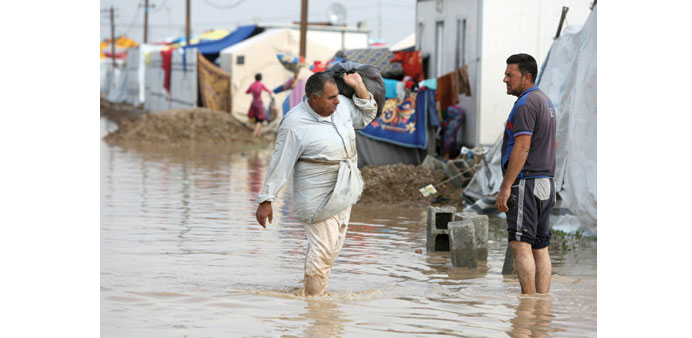Displaced Iraqis stand in flooded water at a camp in Baghdad following heavy rainfall last week. Iraq government spends about $40bn a year on the salaries of state employees, much of it for soldiers and police officers. Another $10bn goes on the pensions of 2mn retirees.
Bloomberg
Baghdad/Washington
Iraq is planning unprecedented salary cuts for senior civil servants, as a more than year-long war against Islamic State and the plunge in oil prices deepen the nation’s financial crisis.
Iraqis increasingly sought security in state employment amid the turmoil that followed the 2003 US invasion, and the government now provides jobs for 3mn people, or 20% of the workforce. The International Monetary Fund in 2009 advised Baghdad to revise salary laws but, fearing a backlash, officials put off a decision. This time, the government has to act, Prime Minister Haider al-Abadi said last week.
“The drop in oil prices and the country’s involvement in a war that’s exhausting large amounts of money from the budget have put the government in financial difficulty,” he said. “Reforms have hurt some but we’ll reach a dead end if we don’t take such measures.”
Widespread protest over the salary cuts would add to pressures on Abadi, who’s supported by the US as the best hope of preventing Iraq’s permanent fracturing.
His administration is already facing mounting anger over corruption, and sectarian tensions sparked by the role of Iran-backed militias in the fight against Islamic State. The jihadist group controls about a third of Iraq, and in areas recaptured by the army, the slow pace at which services are restored is also stirring dissatisfaction.
Iraq says the conflict is costing it about $10mn a day. Add to that the slump in oil prices and the result, the IMF says, is a likely budget deficit of about 23% of economic output this year. The government spends about $40bn a year on the salaries of state employees, much of it for soldiers and police officers. Another $10bn goes on the pensions of 2mn retirees.
“How can we spend on war, health, education, agriculture, services and the poor?” Abadi told a group of university professors, who have staged demonstrations against the planned pay cuts. He promised to look for ways to soften the impact, for example by reducing interest rates for those who have taken out loans.
“We have already seen several departments of public-sector employees protest against the new scales, and I think these will continue and expand if the plans are not revised,” said Sajad Jiyad, an analyst at the Baghdad-based Iraqi Institute for Economic Reform. “It’s a major challenge.”
The government estimates the changes will save at least $3bn. Of that, $1bn will be used to reduce the deficit, which it says currently stands at about $19bn. The government says workers at the lower end of the civil-service pay scale will receive slight increases, making the salary structure fairer. That could also help limit unrest.
It isn’t yet clear if the salary changes require a vote in parliament, where Abadi could face opposition. Mudher Saleh, an economic adviser to the premier, said by phone that Abadi’s broader reform package has already been approved so a new vote might not be necessary. Still, the pay plan is up for discussion by lawmakers on Thursday.
“It’s the first time since 2003 that we will carry out such deep, sweeping cuts to salaries,” Saleh said, referring to changes made after the removal of Saddam Hussein.
Civil servants at the top of Iraq’s 10-tier scale make about $5,000 a month, while junior employees earn as little as $400 to $500, said Jabbar al-Abadi, a member of parliament’s finance committee. The new law will add about $40 a month to the salaries of those at the lower end, while employees nearer the top will lose about $834 a month.
Grand Ayatollah Ali al-Sistani, who has endorsed Abadi’s reform programme since it began in August, on Friday backed the salary changes as a way to achieve social justice. There’s been stinging criticism from politicians, including former Prime Minister Nuri al-Maliki, as well as from officials in the pro- reform movement.
Salim al-Jabouri, the parliamentary speaker, said the cuts could result in more skilled Iraqis leaving the country. Noura Salim, a lawmaker and member of parliament’s economic committee, described the legislation as a knee-jerk reaction to the cash shortage.
“The new law will directly impact the middle class and make them part of the poor class,” Salim said, adding that the focus should be on tackling corruption. “Lots of mistakes were made by former governments and it’s not realistic that today we blame and burden the people in an attempt to solve the financial crisis.”

